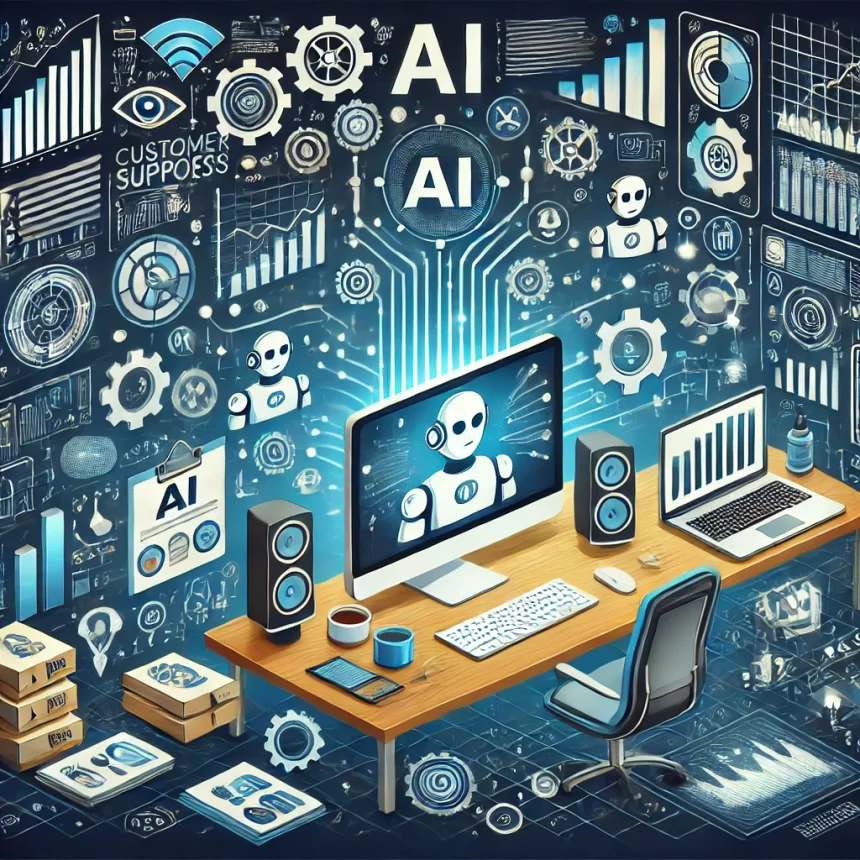In today’s fast-paced business environment, staying competitive requires more than just hard work—it demands smart work. The rise of artificial intelligence (AI) has opened the door for businesses of all sizes to streamline operations, reduce inefficiencies, and improve decision-making processes. From automating mundane tasks to offering deep insights based on data, AI tools can help businesses operate more efficiently and focus on strategic growth.
In this blog, we’ll explore the top AI tools that can streamline your operations, enhance productivity, and improve overall performance. Whether you’re a small business owner or a manager at a large organization, these AI tools can be the key to scaling your business with ease.
1. AI-Powered Customer Relationship Management (CRM) Systems
A well-organized and efficient Customer Relationship Management (CRM) system is essential for businesses that want to build strong, lasting relationships with their customers. AI-powered CRMs go beyond storing customer information—they provide actionable insights, automate communications, and predict customer behavior.
Top AI CRM Tools:
- Salesforce Einstein: Integrated with the Salesforce platform, Einstein uses AI to help sales teams predict leads, recommend the next best action, and automate repetitive tasks such as email follow-ups and data entry.
- HubSpot CRM: HubSpot’s AI-driven CRM provides automated email marketing, personalized customer interactions, and lead scoring, helping businesses engage with customers in more meaningful ways.
- Zoho CRM: Zoho’s AI assistant, Zia, helps users make smarter business decisions by analyzing customer data, predicting sales trends, and automating workflows.
Benefits of AI-powered CRMs:
- Better customer segmentation
- Personalized communication
- Predictive analytics for customer behavior
- Task automation for marketing and sales teams
AI-powered CRM systems help businesses optimize customer engagement, reduce manual efforts, and generate more effective sales strategies by leveraging data-driven insights.
2. AI Chatbots for Customer Service and Support
Delivering high-quality customer service is a challenge for businesses, especially if they need to provide support 24/7. AI chatbots can be an invaluable asset for customer support teams, handling customer inquiries, offering solutions to common problems, and escalating more complex issues to human agents.
Top AI Chatbot Tools:
- Intercom: Known for its powerful conversational AI, Intercom uses bots to provide real-time support, answer customer questions, and guide users through troubleshooting.
- Drift: Drift’s AI-powered chatbot platform helps businesses engage with website visitors, qualify leads, and set up meetings—all without human intervention.
- Tidio: Tidio is an affordable option for small businesses, providing AI chatbots that can answer frequently asked questions, process orders, and provide basic support services.
Benefits of AI chatbots:
- 24/7 customer support without human staffing costs
- Instant responses for common customer queries
- Scalability for handling multiple customer interactions simultaneously
- Improved customer satisfaction through fast issue resolution
AI chatbots not only streamline customer service operations but also ensure customers receive immediate attention, leading to better customer experiences and higher retention rates.
3. AI-Powered Analytics and Business Intelligence Tools
For businesses that rely on data to make decisions, AI-powered analytics tools are crucial. These tools can analyze large datasets, recognize patterns, and provide actionable insights, helping businesses make better decisions faster.
Top AI-Powered Analytics Tools:
- Tableau: Tableau leverages AI to analyze complex data sets and present the findings in visual, easy-to-understand dashboards. Its AI-driven “Ask Data” feature allows users to ask questions in natural language and get instant insights.
- IBM Watson Analytics: IBM Watson provides businesses with AI-driven data analytics and predictive modeling, helping them understand trends, make accurate forecasts, and gain deeper insights from their data.
- Google Cloud AI: Google’s AI and machine learning tools help businesses analyze their data, improve decision-making, and automate various data processes.
Benefits of AI-powered analytics tools:
- Predictive analytics for future trends and demands
- Automated data analysis, reducing the need for manual input
- Enhanced decision-making based on real-time data insights
- Visualized reports and dashboards for easier comprehension
By incorporating AI-powered analytics, businesses can turn raw data into actionable strategies that drive growth, improve performance, and increase efficiency.
4. AI for Supply Chain Management and Inventory Optimization
Managing the supply chain and inventory is a complex task, but AI can simplify and optimize these processes. AI tools can analyze patterns, forecast demand, and automate reordering processes, ensuring that businesses have the right amount of stock at the right time.
Top AI Tools for Supply Chain and Inventory Management:
- Llamasoft: Llamasoft’s AI-powered supply chain analytics platform helps businesses optimize their logistics networks, predict demand, and reduce costs.
- ClearMetal: ClearMetal provides predictive AI for inventory and supply chain management, improving supply chain visibility and helping businesses predict and respond to demand fluctuations.
- E2open: E2open uses AI to automate inventory management, optimize supply chain workflows, and ensure seamless collaboration between suppliers and businesses.
Benefits of AI in supply chain management:
- Improved demand forecasting based on historical and real-time data
- Automated replenishment, reducing stockouts and overstocking
- Enhanced supply chain visibility and risk management
- Reduced costs by optimizing logistics and inventory levels
AI tools for supply chain management help businesses run leaner, reduce operational costs, and avoid potential disruptions in the supply chain.
5. AI-Powered Task Management and Workflow Automation
Managing day-to-day operations can be overwhelming for business owners and managers. AI-powered task management tools streamline workflows by automating repetitive tasks, tracking progress, and ensuring that team members are focused on high-priority activities.
Top AI-Powered Task Management Tools:
- Trello with Butler: Trello’s Butler AI automates tasks within your project boards, such as assigning tasks, creating due dates, and sending reminders, allowing teams to stay organized without constant manual input.
- Monday.com: Monday.com leverages AI to automate workflows, track project progress, and optimize team collaboration, providing a centralized platform for managing tasks and deadlines.
- Asana: Asana’s AI-powered automation tools help teams manage complex projects by automating repetitive tasks, offering personalized task suggestions, and sending automatic updates on progress.
Benefits of AI task management tools:
- Automated task assignments and scheduling
- Personalized task prioritization based on historical data
- Real-time progress tracking and reporting
- Reduced manual oversight of project timelines
AI task management tools allow teams to focus on the bigger picture while automating routine tasks, leading to improved productivity and more efficient project delivery.
6. AI Marketing Automation Tools
Marketing is one of the most time-consuming aspects of running a business, but it’s also one of the most critical. AI marketing automation tools allow businesses to scale their marketing efforts without increasing their workloads. These tools can automate everything from email campaigns to social media posts, ensuring that marketing messages reach the right audience at the right time.
Top AI Marketing Automation Tools:
- Mailchimp: Mailchimp uses AI to automate email marketing, offering personalized recommendations on email content, subject lines, and the best times to send campaigns.
- HubSpot: HubSpot’s AI-powered marketing automation platform helps businesses create targeted marketing campaigns, segment audiences, and automate lead nurturing processes.
- Hootsuite: Hootsuite leverages AI to optimize social media scheduling, provide recommendations for content, and analyze performance to improve future campaigns.
Benefits of AI marketing automation:
- Increased personalization of marketing campaigns
- Automatic optimization of content and delivery times
- Audience segmentation based on behavior and preferences
- Data-driven insights to improve future marketing strategies
By adopting AI marketing automation tools, businesses can save time, reach larger audiences, and drive higher engagement with less manual effort.
7. AI for Human Resources and Recruiting
AI is transforming the human resources (HR) sector, especially in recruiting, onboarding, and talent management. AI-powered HR tools help businesses find the right candidates, streamline the hiring process, and manage employee engagement more effectively.
Top AI HR Tools:
- Breezy HR: Breezy HR uses AI to automate candidate sourcing, resume screening, and interview scheduling, helping businesses hire top talent faster.
- HireVue: HireVue’s AI-powered video interview platform analyzes candidate responses and assesses key competencies, making the hiring process more efficient and less biased.
- Zenefits: Zenefits uses AI to streamline employee onboarding, benefits management, and compliance, reducing the time HR teams spend on administrative tasks.
Benefits of AI in HR:
- Automated candidate screening and interview scheduling
- Reduced bias in the hiring process through objective assessments
- Improved employee engagement and retention through personalized recommendations
- Enhanced compliance and policy enforcement through automation
AI tools in HR help businesses build stronger teams by automating time-consuming administrative tasks and enabling more strategic decision-making.
8. AI for Financial Management and Accounting
Managing finances and accounting can be overwhelming, especially for small and medium-sized businesses. AI-powered financial management tools can automate everything from bookkeeping to financial forecasting, helping businesses maintain better control over their finances.
Top AI Financial Management Tools:
- QuickBooks Online: QuickBooks leverages AI to automate bookkeeping, categorize expenses, and generate financial reports, helping small businesses stay on top of their finances.
- Xero: Xero uses AI to streamline invoicing, payroll, and bank reconciliation, offering real-time financial insights to business owners.
- Fyle: Fyle’s AI-powered expense management platform automatically tracks employee expenses, integrates with accounting software, and ensures compliance with financial policies.
Benefits of AI financial tools:
- Automated bookkeeping and financial reporting
- Predictive analytics for cash flow management
- Real-time tracking of expenses and income
- Enhanced compliance and error reduction in accounting
AI financial management tools simplify the complex world of accounting, ensuring that businesses can focus on growth rather than administrative tasks.







